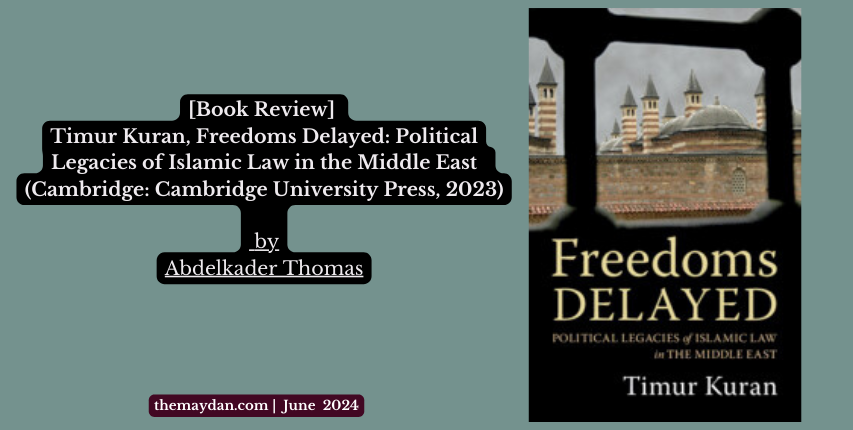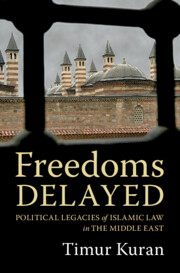
In Freedoms Delayed, Timur Kuran attempts to reveal how Sharī’ah affects “Patterns of civic engagement, understandings of religious liberties, distributions of political power, and relative economic capabilities…” (p . 4) Kuran, a prolific scholar whose publications include a focus on Islamic law as well as political and economic development in Muslim countries, stretches his economic arguments to politics by alleging that four Sharī’ah rulebooks assure that Islamic countries are unfree. He charges inheritance, waqf (a charitable perpetuity), the late embrace of corporate personhood, and the rejection of interest as the disabling laws.
 Kuran’s book is organized in five parts. The first sets out the theme that Islamic law can only deliver an illiberal political order. The second argues that Islamic socio-economic organization is necessarily atomizing. The third seeks to demonstrate that the Islamic order as it has evolved is undoubtedly repressive. The fourth pulls together the economic theme that is larded through the book: Had the Sharī’ah been interpreted differently Muslim states might be modern and free. The fifth, Kuran’s conclusion, suggests that a different order is possible.
Kuran’s book is organized in five parts. The first sets out the theme that Islamic law can only deliver an illiberal political order. The second argues that Islamic socio-economic organization is necessarily atomizing. The third seeks to demonstrate that the Islamic order as it has evolved is undoubtedly repressive. The fourth pulls together the economic theme that is larded through the book: Had the Sharī’ah been interpreted differently Muslim states might be modern and free. The fifth, Kuran’s conclusion, suggests that a different order is possible.
Kuran delivers fourteen chapters offering comparative political and economic analysis of the contemporary Middle East. He relies on his interpretations of historical data and Sharī’ah to conclude that Islamic law is the key factor causing economic underdevelopment as well as authoritarianism.
Although Kuran may have identified challenges to a liberal order, he struggles to differentiate between symptoms and causes. This review highlights and contests a few of his key arguments.
Atomistic Societies
Inegalitarian inheritance systems such as primogeniture promoted organizational development through one other channel. Disfavored children sought business opportunities outside the family, which generated trust-building interactions with strangers. (Note 18, p. 332)
In Kuran’s view large accumulations of inherited wealth allow the formation of grand enterprises, stimulate markets, and encourage entrepreneurship among the disinherited. Even if the first is true, the last begs the question of why wouldn’t Muslim inheritors of small amounts prove to be equally enterprising?
Estate Planning & Corporations
The second part of Freedoms is devoted to waqf. Kuran suggests that waqf, a restricted charitable body, was a planning vehicle to prevent Sharī’ah from breaking up large estates. Waqf occupies three chapters in which Kuran is highly critical of how it was administered. Kuran laments that waqf failed to produce two outcomes: Waqf should have been a model for a limited liability corporation, and it should have spawned political engagement. “Waqfs came to control vast resources. They could have used their financial base to constrain the state and advance their constituents’ freedoms.” (p. 15) This view projects modern understandings on historical behavior. On the one hand, Malik (2012, p. 12) challenges whether or not Ottoman awqaf had the capacity to generate political opposition on the grounds that these were typically managed by people close to the throne. On the other hand, the wider view has always been that muḍārabah, a form of limited partnership, was better suited to spawning the limited liability corporation (see Udovitch 1970).
Politics and Religion
In the third part of the book, Kuran builds a series of arguments around his thesis of preference falsification. (Kuran 1987) A term invented by Kuran in the 1980s, he uses it to describe outward adherence to rules despite harboring different personal beliefs. (Kuran 1987) Kuran’s perspective is the antithesis of Geertz’s (1971) theme of unity and diversity in Islam. Kuran sees no diversity. He searches in vain for liberalizing sects, but finds nothing more than stifling conformity. (p. 190)
In Kuran’s, view preference falsification allows for the development of a culture of prevarication in which the forbidden is practiced by reshaping it as the permissible. A common example that he gives is how credit was delivered in the Ottoman Empire.
For instance, Kuran believes that waqf fostered interest though what he calls ‘ruses’ like sale lease-backs. (p. 82) Funded by the Ottoman era “cash waqf” (pp. 238, 261), these credit tools are not loans at interest. Indeed, they are present in modern secular economies. The latter do not treat them as either deceptions or loans at interest. This brings out the economist in Kuran, if credit is not delivered as a loan, then it is certainly an inefficient trick.
Although Kuran has much to say about the formation of a repressive society, it is in Part IV where he returns to his arguments about how the intersection of finance and politics assures an illiberal society. It is here that Kuran misses out on important historical points. The Ottoman Empire was always legally pluralistic. (Malik, 2012, p. 8) Moreover, the core thesis that Sharī’ah is the culprit causing social, political and economic decay misses a fascinating counter point. Unburdened by Sharī’ah, China, Japan, and India were even slower to develop the institutions of a modern economy than either the Ottomans or their 19th century Egyptian peers. (Ray 1995, p. 521)
Drilling down on the question of partnerships is a worthy exercise. Kuran correctly observes that Sharī’ah partnerships were used for limited purposes and durations. Yet, careful readings of Lydon (2009), Hanna (1998) and Aslanian (2007) reveal how partnerships proliferated to mitigate political and trade risks in the pre and early modern eras. Aslanian even described how non-Muslim minorities used Sharī’ah governed partnerships across jurisdictions into the early modern era.
Conclusion
Kuran ably describes many of the features and problems that characterize much of the Muslim world. Kuran’s great argument is that despite the legalistic nature of Sharī’ah, the contemporary Muslim world appears to suffer from the absence of the rule of law. It is autocratic, perhaps even kleptocratic. Such features typically undermine the atmosphere for investment and political accountability.
His approach, however, is conflicted. “… the Middle East flourished economically when its judicial system accommodated refinements in business practices.” (p. 255) Yet whenever fiqh accommodates change, Kuran calls it either a stratagem or un-Islamic. Many positive modern developments are built on a legal pluralism. Bechor (2007) describes how Sanhūrī saw the modern Egyptian code as consistent with Sharī’ah. This type of complex pluralism eludes Kuran.
Freedoms has three opportunities for teaching. The first is to challenge the presumptions that many of us make in our analysis of texts, events, and processes. One might be disinclined to accept Kuran’s arguments, but they provide a tool to read Bechor, for example, from a different perspective. Even the theory of preference falsification is worth testing in the field: Will the research affirm Lerner’s Passing of Traditional Society (1958) or Geertz’s unity in diversity thesis? Finally, Freedoms allows an instructor a tool to test the impact of bias: Does the Islamic Law Matters theory hold water? Or does it rely on powerful prejudices that lead to a misinterpretation of history and law?
Bibliography
Aslanian, Sebouh, “The Circulation of Men and Credit: The Role of the Commenda and the Family Firm in Julfan Society” in the Journal of the Economic and Social History of the Orient, 2007, Vol. 50, No. 2/3, Spatial and Temporal Continuities of Merchant Networks in South Asia and the Indian Ocean (2007), pp. 124-171.
Bechor, Guy, The Sanhuri Code, and the Emergence of Modern Arab Civil Law (1932 to 1949), (Leiden: EJ Brill, 2007).
Geertz, Clifford, Islam Observed (Chicago: University of Chicago Press, 1971).
Hanna, Nelly, Making Big Money in 1600: The Life and Times of Isma’il Abu Taqiyya, Egyptian Merchant (Syracuse: Syracuse University Press, 1998).
Kuran, Timur, “Preference Falsification, Policy Continuity and Collective Conservatism” in The Economic Journal, Vol. 97, No. 387 (Sep., 1987), pp. 642-665.
Lerner, Daniel and Pevsner, Lucille W., The Passing of Traditional Society (New York: Glencoe, 1958)
Malik, Adeel, “Was the Middle East’s economic descent a legal or political failure?” CSAE Working Paper WPS/2012-08.
Ray, Rajat Kanta, “Asian Capital in the Age of European Domination: The Rise of the Bazaar, 1800-1914” in Modern Asian Studies, Vol. 29, No. 3 (Jul., 1995), pp. 449-554.
Udovitch, Abraham L., Partnership and Profit in Medieval Islam (Princeton: Princeton University Press, 1970).

